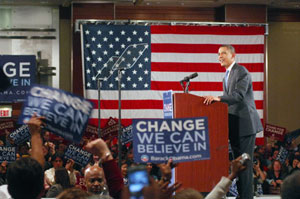ASKIAM
Senior Correspondent
- Obama wins Wisconsin, Clinton has one last chance (Reuters, 02-19-2008)
- FCN Editorial – Is America’s attitude changing? (Reuters, 01-14-2008)

WASHINGTON (FinalCall.com) – Sen. Barack Obama continued his run for the White House with victories in Maine, Louisiana, Nebraska, Washington, and the U.S. Virgin Islands.
The wins over the Feb. 9 weekend gave him a narrow lead in “pledged delegates” from caucuses and primaries over Sen. Hillary Clinton in the battle for the Democratic Party presidential nomination. However, Sen. Clinton held a small lead when “super delegates”–elected officials and party leaders–were counted. RealClearPolitics.com, an independent poll-tracking website, reported Mrs. Clinton had 1,123 delegates, while Mr. Obama had 1,120 delegates. The Illinois Democrat was projected to win an additional 15 delegates to nine delegates for the former First Lady in Maine.
Things looked good for Mr. Obama with his victories and expectations high going into the Feb. 12 “Potomac Primary” covering Virginia, Maryland and the District of Columbia.
The wins came after Super Tuesday victories and talk from strategists that Mrs. Clinton was focusing on winning in March. Her aides argued Texas and Ohio could be big victories. Mrs. Clinton also replaced campaign manager Patti Solis Doyle with Maggie Williams in a surprise move. Her campaign denied the change was a “shake up,” but many saw it as an attempt to halt the Clinton campaign’s freefall.
When Democratic and Republican Party strategists envisioned the Feb. 5 “Super Tuesday” presidential primary in 24 states, they anticipated a virtual national primary in which only the most viable, best financed campaigns would survive.
It was also expected to be a coronation, not a contest for Sen. Clinton. Sen. Obama came on strong, winning Alabama, Alaska, Colorado, Connecticut, Delaware, Georgia, Idaho, Illinois, Kansas, Minnesota, North Dakota and Utah.
“It seems to me that the expectation of the Clinton camp and maybe a lot of other people was that after Super Tuesday, Sen. Clinton would be, clearly the nominee-to-be, and all other candidates, including Barack Obama, would be gone,” Roger Wilkins, Pulitzer Prize-winning former journalist and now a professor of American Culture and George Mason University told The Final Call.
“And instead, they are neck-and-neck. The idea of Clinton’s inevitability, the idea of her access to far more money and resources than he had, right now that’s all evaporated, and they are neck and neck,” Prof. Wilkins continued.
While the Democratic contest is far from being decided, many objective standards now favor Sen. Obama being a more formidable candidate in the November general election against Republican front runner Sen. John McCain.
“If (Sen.) Obama is the nominee, he has the potential to win, and win comfortably and bring additional Democrats in” to office on his coattails, Dr. David Bositis, senior research fellow at the Joint Center for Political and Economic Studies told The Final Call.
“For one thing the enthusiasm and the record turnouts that are occurring right now, he is responsible for. People are not turning out in record numbers to vote for (Sen.) Hillary Clinton,” he said. And, while the Clinton campaign would like to assert that her gender-based campaign has generated energy and excitement equal to the Obama campaign, “It’s just not true.”
“If he is the nominee, not only does he not have all of the negative connotations that Hillary brings, including all the scandals and everything else from when Bill Clinton was president, he will bring that enthusiasm and desire for change, and arguably that’s the Democrats biggest edge right now,” Dr. Bositis continued.
But despite Sen. Obama’s “millennial,” “post-racial” campaign, race and racism are still likely to be important–if unspoken–issues in the 2008 White House race. In addition, Republican dirty tricks must not be discounted, if Sen. Obama wins the Democratic nomination.
What the success of the Obama campaign across most gender, race, economic, and education boundaries has done, is to “create this huge possibility, that everybody’s been talking about, and that is an African American president,” Dr. Ronald Walters, professor of political science at the University of Maryland told The Final Call. “And once people start looking at that in the face, I think people are going to gravitate toward it for one reason or another.
“I’ve said that was not the case because of American racism, but I think at least he can get through the nomination process. Republicans will ‘Swift Boat’ you. They’ll dog you, whatever. It will get down to race in the general election, no question about that, they’re good at that,” Dr. Walters continued, referring to the “Swift Boat” dirty-tricks campaign against Sen. John Kerry (D-Mass.), the 2004 Democratic presidential nominee.
“You don’t have to have any baggage. That’s what Kerry showed. (Sen.) Kerry was a national hero, and they said he wasn’t. They found some people to say he wasn’t. It’s not that you have baggage, these people are creative in creating sort of a counter-narrative, and causing people to doubt whatever you say you are.”
With the Democratic campaign continuing on, possibly to the August convention, Sen. McCain has an opportunity during the interim to overcome his own considerable intra-party liabilities. He is the presumptive nominee with Mitt Romney’s decision to drop out of the GOP contest. Gov. Mike Hukabee, of Arkansas, isn’t seen likely to catch him. But the war hero has problems: Not only is he considered an in-authentic conservative, but his sometimes volatile, abrasive, argumentative personal style has some Republicans anxious about his fitness for the White House.












